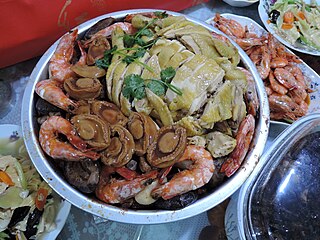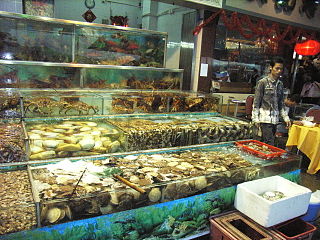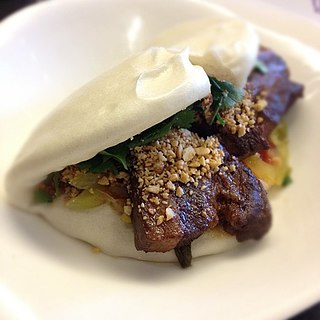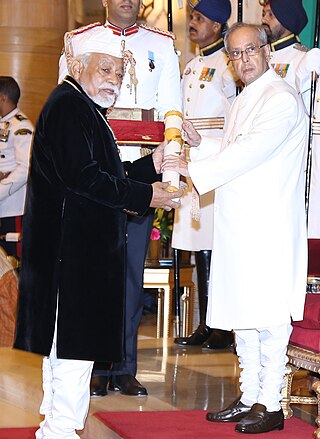
Teochew cuisine,also known as Chiuchow cuisine,Chaozhou cuisine or Teo-swa cuisine,originated from the Chaoshan region in the eastern part of China's Guangdong Province,which includes the cities of Chaozhou,Shantou and Jieyang. Teochew cuisine bears more similarities to that of Fujian cuisine,particularly Southern Min cuisine,due to the similarity of Teochew's and Fujian's culture,language,and their geographic proximity to each other. However,Teochew cuisine is also influenced by Cantonese cuisine in its style and technique.

Beijing cuisine,also known as Jing cuisine,Mandarin cuisine and Peking cuisine and formerly as Beiping cuisine,is the local cuisine of Beijing,the national capital of China.

A restaurant is a business that prepares and serves food and drinks to customers. Meals are generally served and eaten on the premises,but many restaurants also offer take-out and food delivery services. Restaurants vary greatly in appearance and offerings,including a wide variety of cuisines and service models ranging from inexpensive fast-food restaurants and cafeterias to mid-priced family restaurants,to high-priced luxury establishments.
Taiwanese cuisine is a popular style of food with several variations,including Chinese and that of Taiwanese Indigenous peoples,with the earliest cuisines known of being the indigenous ones. With over a hundred years of historical development,mainstream Taiwanese cuisine has been influenced by Hakka cuisine,the cuisines of the waishengren,Japanese cuisine,and American cuisine,with southern Fujian cuisine having had the most profound impact.

Poon choi or puhn choi,pén cài in pinyin,is a traditional Cantonese festival meal composed of many layers of different ingredients. It is served in large wooden,porcelain or metal basins called poon,due to the communal style of consumption. The Chinese name,transliterated as Poon choi,has been variously translated as "big bowl feast","basin cuisine" or "Chinese casserole".

Hong Kong cuisine is mainly influenced by Cantonese cuisine,European cuisines and non-Cantonese Chinese cuisines,as well as Japanese,Korean and Southeast Asian cuisines,due to Hong Kong's past as a British colony and a long history of being an international port of commerce. Complex combinations and international gourmet expertise have given Hong Kong the labels of "Gourmet Paradise" and "World's Fair of Food".

Canadian Chinese cuisine is a cuisine derived from Chinese cuisine that was developed by Chinese Canadians. It was the first form of commercially available Chinese food in Canada. This cooking style was invented by early Cantonese immigrants who adapted traditional Chinese recipes to Western tastes and the available ingredients,and developed in a similar process to American Chinese cuisine.
Annaprashan/ Macha Jankow / Pasni is a Nepali celebration in which a child is fed rice or solid food for the first time. Although centuries old tradition,modern science has established the fact that child's digestive system is capable of processing solid food when they are approximately six months old which is why Pasni is held for when a baby turns six months old but it can vary between daughters and sons.

A Cantonese restaurant is a type of Chinese restaurant that originated in Southern China. This style of restaurant has rapidly become common in Hong Kong.

Great British Menu is a BBC television series in which top British chefs compete for the chance to cook one course of a four-course banquet.

Food presentation is the art of modifying,processing,arranging,or decorating food to enhance its aesthetic appeal.

Weiya is a traditional annual celebration for Tu Di Gong on the 16th of the 12th lunar month in Chinese society,especially in Taiwan. Weiya is the last of the bimonthly Ya festivals honoring the earth god in the Chinese lunar calendar. In Taiwan,Weiya is also an occasion for employers to treat their employees to a banquet to thank them for their hard work throughout the year.

Culinary diplomacy,gastrodiplomacy or food diplomacy is a type of cultural diplomacy,which itself is a subset of public diplomacy. Its basic premise is that "the easiest way to win hearts and minds is through the stomach". Official government-sponsored culinary diplomacy programs have been established in Taiwan,Singapore,Thailand,South Korea,Malaysia,Indonesia,Lebanon,Peru,Israel,the United States,Cambodia,Japan,and Nordic countries.

Zone Pro Site,also known as Zone Pro Site:The Moveable Feast,is a 2013 Taiwanese comedy film directed by Chen Yu-hsun,starring Kimi Hsia,Tony Yang and Lin Mei-hsiu.

Imtiaz Qureshi was an Indian chef known for reviving the Dum Pukht cooking tradition and creating restaurant brands including Bukhara and Dum Pukht. He was a master chef at ITC Hotels,an Indian luxury hotel chain. Qureshi is credited with the popularization of Awadhi cuisine with some of his popular dishes including Dal Bukhara,Dum Pukht Biryani,Kakori Kebab,Warqi Paratha,and Garlic Kheer.
Montu Saini is an Indian chef based in New Delhi. He was posted as Executive chef to the President of India in the Rashtrapati Bhavan from June,2015 to July,2020. He is the recipient of "Young Hotel Chef" Award 2014 from Federation of Hotel &Restaurant Association Of India and "Master Chef" Award 2014 from Indian Culinary Forum

Asma Khan is an Indian-born British restaurateur and cookbook author. She owns Darjeeling Express restaurant in London's Soho and was profiled on the sixth season of the documentary series Chef's Table. In June 2019 Business Insider named her number 1 on their list of "100 Coolest People in Food and Drink".
Duangporn "Bo" Songvisava is a Thai chef and restaurateur. She and her husband,chef Dylan Jones,own and operated Bo.lan,a restaurant in Bangkok's Thong Lo neighborhood. In 2018 Songvisava was profiled on the fifth season of the documentary series Chef's Table.

Lil' Deb's Oasis is a tropical restaurant,bar,and art installation in Hudson,New York,in the upper Hudson Valley. The restaurant has a unique menu,self-described as "tropical comfort food" and including elements of South Asian and Latin American cuisines while sourcing ingredients from the Hudson Valley. Lil' Deb's operates as an interactive art project,performance venue,and community gathering space,as well as operating as a business. The restaurant is oriented toward LGBT cultural themes,defining its hospitality style,and aims to be an LGBT-inclusive space,including hosting queer performance events. The restaurant is positively reviewed by critics,and has seen national media coverage.

The history of catering involves the development and evolution of the service industry that provides food,beverage,and other event services. The word catering comes from the Latin word cater,which means to provide. The business of providing food for parties,meetings,and other gatherings has been around for millennia,with traces back to ancient civilizations. Over time,this profession has grown and evolved into the diverse industry it is today.
















